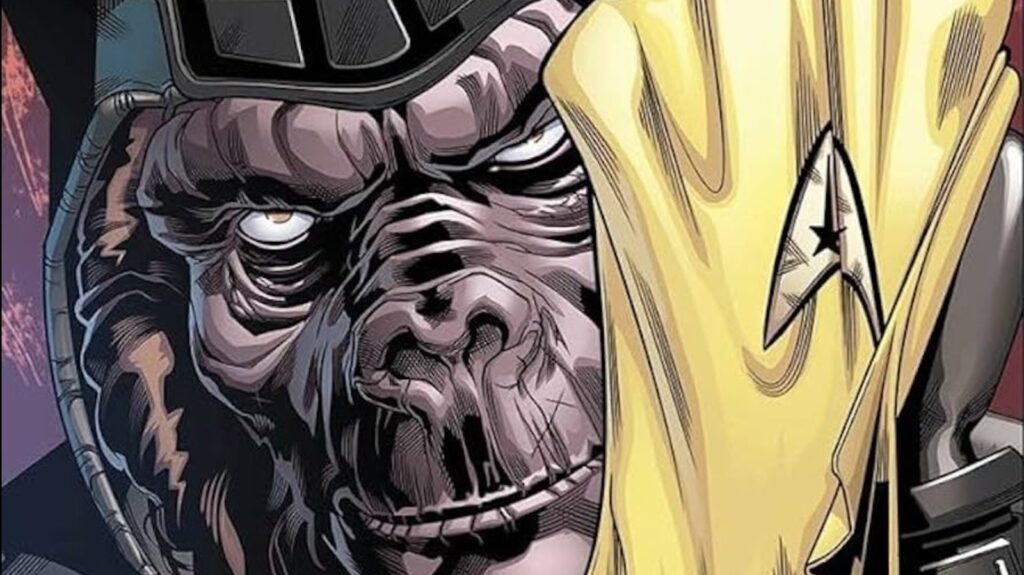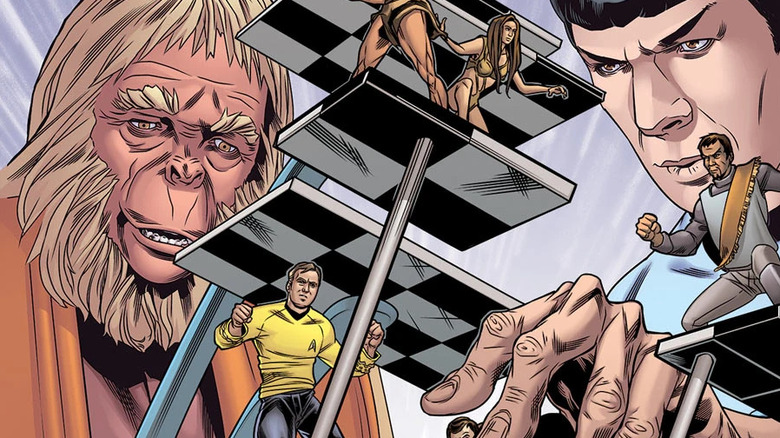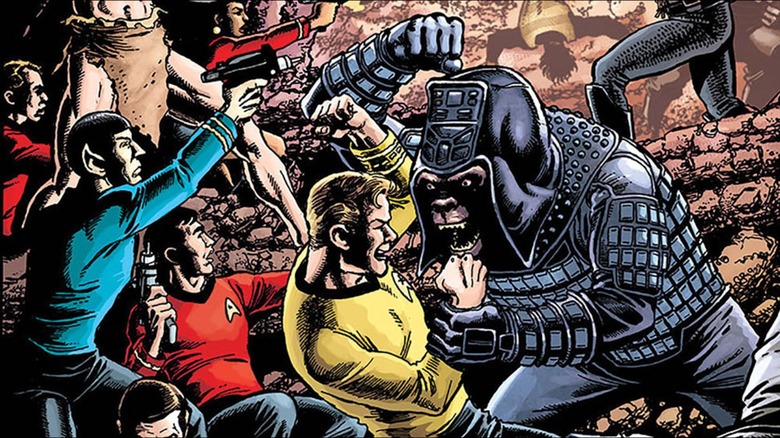When it comes to science fiction, there are only a few franchises that audiences recognize instantly, and even fewer that have become part of our collective culture. “Star Trek” and “Planet of the Apes” are two of those jewels in the pantheon, and while there have been plenty of planned crossovers between franchises that never happened, these two have indeed collided — in an epic comic book miniseries titled “Star Trek/Planet of the Apes: The Primate Directive.”
Released in 2014 as a joint production between IDW Publishing and Boom Studios — the comic book publishers that held the license for both “Star Trek” and “Planet of the Apes” — and written by Scott and David Tipton with art by Rachael Stott, the series sees Captain Kirk and the crew of the Enterprise battling the Klingons over the colonization of a planet in another universe. That planet is Earth, but this bizarre world — one that fans will recognize from the “Planet of the Apes” series — is ruled by primates, and the Klingons want to take control. Kirk and the crew team up with human astronaut George Taylor (played by Charlton Heston in the original film, and whose likeness is used with permission here) in a fight to overthrow the gorilla government and stop the Klingons from expanding their empire.
Beyond the novelty of seeing these two larger-than-life sci-fi icons clashing on the page for the first time, “The Primate Directive” is one of most fun franchise crossovers you’ll find in comics. Even if it sounds fake on paper, we promise it’s real. A briskly-paced adventure story, its biggest flaw is that it is unlikely to ever be adapted to the screen.
Writer Scott Tipton says Trek and Planet of the Apes have a lot in common
While at first glance, it might seem odd for “Star Trek” and “Planet of the Apes” to come together, they have a lot more in common than you might expect. Both franchises hail from the 1960s, with the first “Planet of the Apes” film releasing in cinemas the same year as the final season of the original “Trek” series. Both explore similar themes of humanity’s struggle for a better future, but they do so through wildly divergent visions. Those similarities weren’t lost on “Primate Directive” writer Scott Tipton.
“[‘Star Trek/Planet of the Apes: The Primate Directive’] is about political maneuverings, expansionism, morality, brinksmanship, tragedy, free will versus fate — everything that made classic ‘Star Trek’ and the original ‘Planet of the Apes’ so compelling,” Tipton told Comic Book Resources in an interview promoting the series. The series ultimately pits Captain Kirk and the crew of the Enterprise against their own ideals, as they struggle to decide whether or not the Prime Directive allows them to intercede in a conflict between Earth’s evolved apes and Klingons.
“For me, it’s all about the original product. What we came up with had to feel like it could fit organically into both franchises. That was perhaps the biggest surprise as we were writing it, how easily Kirk and company fit into the world of Taylor and Ape City.”
Planet of the Apes once got another Gene Roddenberry series canceled
While Gene Roddenberry is a legend in Hollywood for creating the greatest science fiction franchise of all time (at least by our reckoning), what some may not realize is that “Star Trek” is just one of several TV shows he developed. In the 1970s, he worked on a series of shows that reached various levels of development, and one of them was canned thanks to “Planet of the Apes.” It was called “Genesis II,” and, despite the suffix, it wasn’t a sequel.
Produced in 1973, “Genesis II” revolves around a contemporary astronaut named Dylan Hunt (played by future “Airwolf” star Alex Cord), who is testing a new suspended animation technology designed for long-term space travel. Through a confluence of disastrous events, Hunt fails to be reawakened at the right time and is instead revived in the year 2133. What he finds is a bitter, post-apocalyptic future that is nothing like the world he left behind.
“Genesis II” had a pilot episode produced that was aired as a movie-of-the-week. Unfortunately, at the same time, the network was also developing a spin-off (now mostly forgotten, like several other sci-fi franchise flops) of the “Planet of the Apes” movie series. Unwilling to greenlight two expensive science fiction shows, CBS chose “Apes,” and “Genesis II” never went to series. The final irony is that the “Planet of the Apes” TV series was a one-season disappointment. Dylan Hunt’s name — but not his backstory — would live on in another Roddenberry series: “Andromeda,” which managed five seasons.



